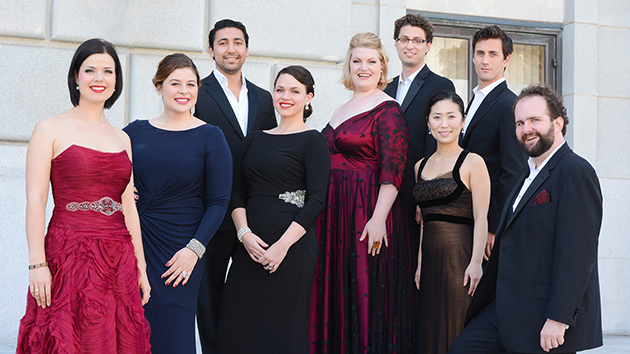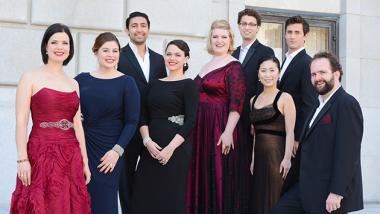
Hypey as it sounds, “The Future Is Now” lived up to its claim for Thursday’s Adler Fellows Gala Concert at the Scottish Rite Masonic Center. Much more than an aria-and-ensemble showcase for the San Francisco Opera’s emerging bright lights, this well-planned and shapely program captured much of the dramatic excitement, stylistic variety and transformative fusion of music, meaning and personality that opera delivers like nothing else.
Almost everyone seemed ready for prime time. The company apparently concurs. As San Francisco Opera Center director Sheri Greenawald noted in her opening remarks, Adler Fellows appeared in every production on the 2014 War Memorial Opera House bill.
Opening with a wistful selection from Carmen and ending with the heroine’s death by knifing at the hands of Don José, the evening ranged from Baroque to bel canto to Dvořák, Stravinsky, and Richard Strauss. There were some stand-and-deliver arias as well as semi-staged scenes, resourcefully carried off on the theater’s carpeted stage apron steps. Baritone Hadleigh Adams was the raffish master of ceremonies in a comic bit from Così fan tutte, supported by three fellow Adlerites in non-singing roles. Bass baritone Philippe Sly, as the wounded and jealous Goulaud, and soprano Maria Valdes, as his wary and guarded young wife, wove a melancholic spell in a long and beautifully rendered extract from Debussyʼs Pelléas et Mélisande. Romantic love took on its sunny and stricken faces in those two selections. As San Francisco Opera Center director Sheri Greenawald noted, Adler Fellows appeared in every production on the 2014 War Memorial Opera House bill.
The tone grew deeper and darker as the evening progressed, with the second half of the program bracketed by mezzo Zanda Švēde’s smoky and sumptuous “Mon coeur s’ouvre à ta voix,” from Saint-Saëns’ Samson et Dalila, and Carmen’s death scene, opposite a donnish but persuasively distraught tenor A.J. Glueckert. Baritone Efraín Solís’ intense and fervently felt patriotic aria from Donizetti’s unfinished Dom Sébastien came right after the Debussy immersion, followed in turn by soprano Erin Johnson’s powerhouse maternal plea (Morrò, ma prima in grazia) from Un Ballo in Maschera and the lighter soprano Jacqueline Piccolino’s achingly tender and tightly focused “Song to the Moon” from Dvořák’s Rusalka.
There was, wonderfully, no let up. The San Francisco Opera Orchestra, under Opera Theatre of St. Louis Music Director Stephen Lord, partnered every singer and scene with sensitivity and musical character. A demonstrative audience registered their delight throughout.
One of the particular pleasures was hearing singers in contrasting repertoire. Solís brought a dazzling sense of purpose to a martial aria from Handel’s Rodelinda, with every ornament urgent and essential, then returned after intermission for a daringly tremulous reading of his Donizetti assignment. Valdes, charmingly overdressed in a red dress with frilly petticoats and rumpled gloves, was sweetly stirring as a doubt-filled but determined Anne Truelove from The Rake’s Progress, a quality she enriched and complicated as Mélisande. Piccolino preceded her Dvořák turn with “Non fu sogno,” from Verdi’s I Lombardi, a fitting display of her formidable if somewhat small-voiced bel canto chops. One last takeaway from this rich evening of vocal splendor and potential was how poised and self-possessed the singers were.
Even when they have two chances to impress, singers can only show so much in a setting like this. Judgments should be provisional at best. Glueckert, for example, may not be ideally cast as Bizet’s tormented lover Don José, but his warmly seductive tenor and expert phrasing came across unmistakably in his two Carmen moments. Soprano Erin Johnson, by contrast, steamrolled through her tragic aria from Strauss’ Ariadne auf Naxos, overplaying her vocal hand with a voice that was loud and arresting without the commensurate ripeness or finesse. There’s time for that to bloom, of course. All these Adler fellows stand at the beginning of very promising roads ahead.
One last takeaway from this rich evening of vocal splendor and potential was how poised and self-possessed the singers were. To a one, they made their entrances and exits smoothly, stepped forthrightly into character and accepted their ovations with graciousness and modesty. The audience felt it all and responded in kind. The cheers, one couldn’t help feeling, weren’t only for what they’d heard that night but for the many more nights to come.

